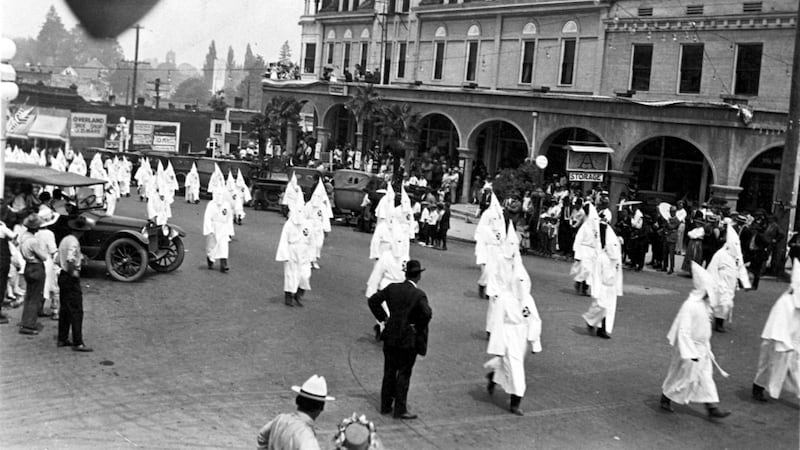We call KKK many things. "Disgusting" comes to mind. Maybe "deplorable."
One adjective the woke city of Portland can't use is "foreign."
The state of Oregon's gotten a lot of flack for its racist history. And that is deserved.
Kerry Tymchuck, Executive Director at the Oregon Historical Society, estimates Oregon's Klan was about 35,000 strong in the early 20s. That accounts for the largest contingent west of the Mississippi River, and they weren't exactly subtle. .
Take a 1921 march in Ashland, for instance…

There were a bunch of Portland rallies and Klan gatherings around the same time, too. Like this one, where KKK members gather under a Jesus Saves banner with zero irony. (The location is unconfirmed; the OHS thinks it was somewhere near Portland.)

They didn't stop at marches and rallies, though.
They actually influenced the state's government. Several historically prominent Oregonian politicians were cozy with the Klan. Take, for instance, George Luis Bake, Portland's mayor from 1912 to 1932. Bake was photographed in 1921 next to a pair of KKK members.
Here he is, third from the right.

Not exactly a good look.
But 1922 was the Klan's "big victory year," says Tymchuck, director of the OHS.
The Klan—then a powerful political force in the state—would throw their support behind gubernatorial candidate Walter M. Pierce. Pierce did his part, backing the Klan's bill to attack private Catholic education by requiring all children to attend public schools. The bill was struck down by the Supreme Court three years later, but Pierce won the race over the incumbent Ben Olcott by a healthy 15 percent.
They pulled this off by combining their usual hateful bullshit—in this case, anti-catholic and racist propaganda—with a legislative platform, like campaigning for better roads. After the election, Tymchuck says the Klan in Oregon "dissolved fairly quickly." Pierce only served one term.
You can trace the roots of Oregon's white supremacy problem back to the state's founding. During Oregon's constitutional convention in 1857, the people—then around 10,000 settlers—voted on whether Oregon should be a free or slave state, and whether Oregon should allow entry of African-Americans into its territory.
Oregon became a free state by a large voting margin.
But African-Americans were banned. Though the clause was never enforced—it was rendered moot by the 14th Amendment—it wasn't physically amended until 1926, nearly 70 years later.
"That's not a very good start," Tymchuck says.
No shit.
